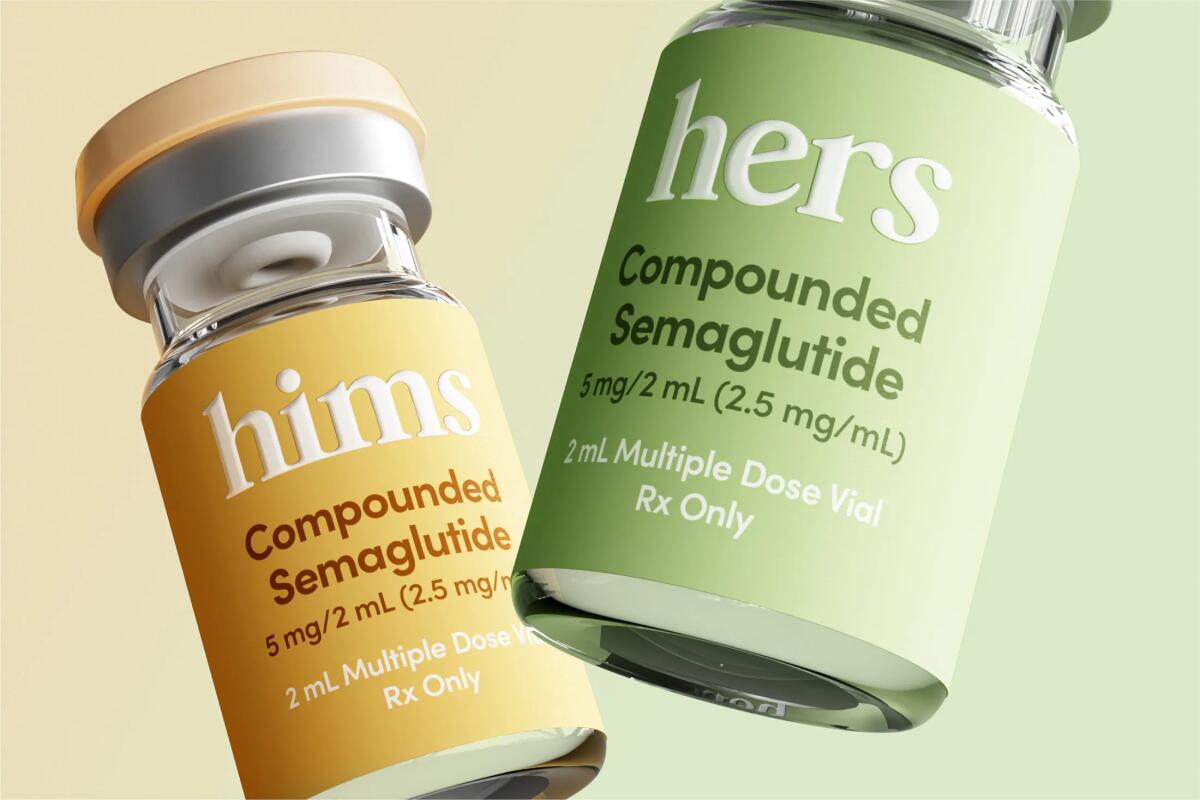Cheaper alternatives to Ozempic are flooding the weight-loss market. Are they safe?

- Share via
When Tina Jacobson tried to get Ozempic to lose weight, her health insurance provider denied coverage because she was not diabetic.
Instead of paying more than $1,000 out of pocket for the Type 2 diabetes drug, which lowers blood sugar levels and suppresses appetite, the Florida real estate agent turned to a clinic that prescribed her a cheaper alternative.
The compounded version, made by a specialized pharmacy using semaglutide — the active ingredient in Ozempic — cost $350 a month. The 5-foot-7-inch Jacobson began taking it last summer when she weighed nearly 200 pounds; by January, she had lost 50 pounds.
“I know a couple people who are doing Ozempic and Wegovy,” said Jacobson, 52, referring to another semaglutide-based drug that patients are using to shed pounds quickly. “But for the most part, pretty much everyone I’ve talked to is on a compound.”

Subscribers get exclusive access to this story
We’re offering L.A. Times subscribers special access to our best journalism. Thank you for your support.
Explore more Subscriber Exclusive content.
As a game-changing new class of injectable diabetes and obesity drugs surges in popularity, widespread shortages and steep prices for brand-name GLP-1 drugs — which also include Mounjaro and Zepbound — have persisted, pushing droves of weight-loss hopefuls into a booming, less regulated secondary market for copies that are more affordable and readily available online.
Compounded drugs, as they are called, are not approved by the Food and Drug Administration, meaning the agency does not verify their safety, effectiveness or quality. Although compounded forms serve an important role in the pharmaceutical industry, there are also risks — concerns that have grown in the Ozempic era as telehealth startups, med spas and online pharmacies proliferate, eager to get in on the craze.
“We urge patients to be vigilant,” said a spokesperson for the FDA, which has issued several alerts and letters recently about concerns related to compounded semaglutide.
Unfortunately, a lot of patients are doing that legwork on Reddit or TikTok and they’re getting awful advice. I spend half my time trying to differentiate between some of the sketchy stuff that is going on online.
— Scott Brunner, chief executive of the Alliance for Pharmacy Compounding
Compounding is legal and has been around for decades. A drug may be compounded for a patient who, for example, is allergic to a dye in the brand-name drug or needs a medication to be made in liquid form instead of a pill.
They are also allowed when an FDA-approved drug is on the agency’s drug shortage list. Semaglutide and tirzepatide, the active ingredient in Mounjaro and Zepbound, are both on the list, which has led to tailor-made compounded versions flooding into the market.
“We’ve got this extraordinary era we’re in where GLP-1s have become a phenomenon that even the drugmakers could not have predicted — they are unable to meet the demand,” said Scott Brunner, chief executive of the Alliance for Pharmacy Compounding. He said the national trade group does not track industry figures because compounded drugs are typically not covered by insurance and are paid for out of pocket, making it difficult to know how much is being dispensed.
Patients taking Ozempic and other trendy injectables are going under the knife to correct the side effects of rapid weight loss, which include sagging skin, hollow cheeks and an aged appearance.
In the hierarchy of the country’s pharmaceutical industry, compounds occupy a widely misunderstood spot. They are not generics, which the FDA considers to be “bioequivalent” to name-brand drugs, and which undergo review by the agency and are permitted to be sold after patents expire.
Nor are they counterfeit knockoffs, like “a ‘Louis Vuitton’ purse on the sidewalk in New York,” Brunner said.
The challenge is knowing the difference, a responsibility that is falling on consumers to figure out.

“Unfortunately, a lot of patients are doing that legwork on Reddit or TikTok and they’re getting awful advice,” Brunner said. “I spend half my time trying to differentiate between some of the sketchy stuff that is going on online.”
About 42% of online pharmacies selling semaglutide are operating illegally, according to a study published this month in the medical journal JAMA Network Open.
“Semaglutide products are actively being sold without prescription by illegal online pharmacies, with vendors shipping unregistered and falsified products,” the study’s authors said.
Compounded drugs can be lawfully prepared in state-licensed pharmacies, federal and outsourcing facilities, and by licensed physicians.
The murky online marketplace for compounded semaglutide has kept global regulatory agencies busy. In the U.S., the FDA has been addressing a variety of problems as consumer demand has soared.
Many of the patients who received vials of compounded semaglutide lacked experience with self-injections.
— Food and Drug Administration
The agency has issued warning letters to stop the distribution of illegally marketed semaglutide, saying the drugs “may be counterfeit, which means they could contain the wrong ingredients, contain too little, too much or no active ingredient at all, or contain other harmful ingredients.”
In July, it said that it had received reports of dosing errors with compounded semaglutide injectable products, some of which landed patients in the hospital.
Unlike brand-name Ozempic and Wegovy, which come in prefilled injection pens, compounded semaglutide is typically sold in vials; patients are given syringes and must measure and self-administer the medication on their own. The FDA said errors had resulted from patients giving themselves the incorrect amounts of the drug and from healthcare providers miscalculating doses when writing prescriptions.
“Many of the patients who received vials of compounded semaglutide lacked experience with self-injections,” the FDA said. “Unfamiliarity with withdrawing medication from a vial into a syringe and coupled with confusion between different units of measurement (e.g., milliliters, milligrams and ‘units’) may have contributed to dosing errors.”
As powerful anti-obesity drugs become more widely available, companies are repositioning themselves with new products and services.
And last year, the FDA said some compounders might have been making their products with salt forms of semaglutide, which is different from what is used in the name-brand drugs.
“Products containing these salts, such as semaglutide sodium and semaglutide acetate, have not been shown to be safe and effective,” the agency said.
The FDA encourages consumers to carefully research online pharmacies. It has provided tips, such as buying only from a business that requires a doctor’s prescription, is licensed with a state board of pharmacy and has a licensed pharmacist on staff to answer questions.
Not surprisingly, Novo Nordisk, which makes Ozempic and Wegovy, and Eli Lilly, which makes Mounjaro and Zepbound, do not condone the copies of their drugs. With the market for GLP-1 drugs predicted to exceed $100 billion by 2030, the pharmaceutical companies have been jostling for industry supremacy and are taking on businesses that they believe are encroaching on their sales and brand names.
“Patients should be aware that Novo Nordisk is the only company in the U.S. with FDA-approved medicines containing semaglutide,” a spokesperson for the Danish healthcare company said, “and we do not directly or indirectly provide or sell bulk semaglutide to compounding pharmacies or any other entity.”
I ended up just staying on the compound because I didn’t want to have to deal with those shortages. I would be on branded if it were available to me, and consistently.
— Kaylee Stutts, 30, who switched to compounded semaglutide after running into availability issues with Wegovy
Last week, the company reported that second-quarter sales of Ozempic rose 30% to $4.26 billion, while Wegovy sales surged 53% to $1.71 billion.
Novo Nordisk said it has filed 34 lawsuits nationwide against medical spas, weight-loss clinics and compounding pharmacies that it says are engaging in unlawful marketing and sales of compounded drugs claiming to contain semaglutide.
But until the pharmaceutical giants produce enough of the drugs for them to be removed from the FDA’s shortage list, compounding will continue to constitute a significant portion of the GLP-1 market.
The prospect of the branded drugs eventually being removed from the shortage list has not stopped telehealth companies from doubling down on compounded drug offerings.
In May, virtual health and wellness platform Hims & Hers Health began selling injectable compounded semaglutide. Customers have since reported having lost an average of 10.2 pounds in their first month, the company said.
“There is huge interest. It’s almost like you don’t have to do marketing for it,” said Pat Carroll, the company’s chief medical officer. “The number of folks in this country who could benefit from this medication is astounding. What they’re struggling with is not only access to the medications but also the cost.”

Although Hims & Hers began selling name-brand Ozempic last week, it is priced at $1,799 per month. In stark contrast, the San Francisco company is selling compounded semaglutide for $199 per month with a 12-month prescription.
Kaylee Stutts, 30, was originally hesitant about trying a compounded weight-loss drug. She started taking Wegovy in June 2023 but kept facing shortages when she tried to get refills through Amazon Pharmacy.
“I would go in and it would just say ‘not available,’ and I would check and check,” the online content creator from Seattle said. “I was stretching my doses out for like 10 days at a time.”
After two “anxiety-inducing” months, she switched to compounded semaglutide and later to compounded tirzepatide, which she found worked better for her body. She is now 175 pounds, down from 230.
“I ended up just staying on the compound because I didn’t want to have to deal with those shortages,” Stutts said. “I would be on branded if it were available to me, and consistently.”
Sign up for This Evening's Big Stories
Catch up on the day with the 7 biggest L.A. Times stories in your inbox every weekday evening.
You may occasionally receive promotional content from the Los Angeles Times.
More to Read
Sign up for This Evening's Big Stories
Catch up on the day with the 7 biggest L.A. Times stories in your inbox every weekday evening.
You may occasionally receive promotional content from the Los Angeles Times.













